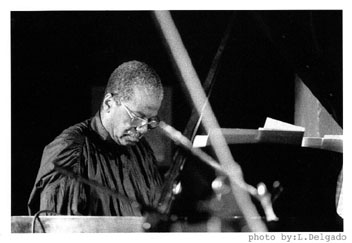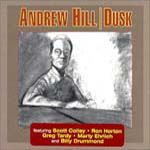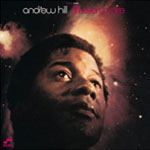

Courtesy
of Andrew Hill
photo by L. Delgado

Palmetto

Blue Note Records
A
FIRESIDE CHAT WITH ANDREW HILL
Point
of Departure is one of my favorite albums. So I have a high bias when
it comes to Andrew Hill. This is my candid conversation with him, about
the record, his years with Blue Note, and his upcoming record on the Palmetto
label, as always, unedited and in his own words.
FRED JUNG: Let's start from the beginning.
ANDREW HILL: To my memory, I could play the piano as long as I've been
talking. My formal lessons came at a later period. My first jazz recording
I did was with, who did I do that with? I did it with David Shipp in the
'50s, with Von Freeman.
FJ: You made your way to New York in the early '60s, do you recall how
vibrant the scene was during that time?
ANDREW HILL: Oh, the scene was budding, Fred. There was a lot of what
I call flowers on the scene because it was the zenith of jazz as a popular
music. It came from a period where everyone who played music had heard
music in their neighborhoods from black theatres where they had bands.
It was the last of a period. It was almost like being there after the
party. The party was over, but there was still a few things to be had.
FJ: How did your contract with Blue Note come about?
ANDREW HILL: I played on this Our Thing session with Joe Henderson. He
invited me to the session and during the session, they approached me to
start recording for them.
FJ: Point of Departure is such an important recording and has had an indelible
impact upon generations of musicians, what are your thoughts looking back
at that Blue Note recording thirty-five years later?
ANDREW HILL: This was still in the first year of my Blue Note recording
contract. Eric (Dolphy) was playing at the Five Spot with Charlie Mingus.
I thought I would get together with him and talk music and he was kind
enough to work a few jobs with me and so I presented the idea to Blue
Note and they bought it. At first Charles Lloyd was going to play tenor,
but for reasons beyond anyone's control, except Charles, he couldn't make
it. So consequently, Joe became tenor saxophonist. And Kenny Dorham, who
could play almost anywhere, was good. And then, Tony Williams had come
to town and everyone was talking about him. All of a sudden, there was
a nucleus formed for the band and we just made two Blue Note rehearsals
and went on and did the session.
FJ: I never knew Lloyd was originally slated for the tenor role. Point
of Departure was so ahead of its time. I was listening to it the other
day and the music is still fresh and explorative.
ANDREW HILL: Well, a lot of people say that, Fred, and I'm grateful they
think that, but that was just the level that the music had gotten to,
you know, risen to in the '60s. It wasn't an isolated, academic situation
because there was a synergy with the jazz audiences at that time. There
were no limitations. They give bebop more credit than it deserves, because
bebop was not an academic situation. It was just something that the people
could feel, Charlie Parker and then Monk.
FJ: For the extensive period of time you were with Blue Note, your recording
output in comparison to others on the label is low, why did you not document
more of your music?
ANDREW HILL: Well, as far as recording, I did my share of recordings,
but I held back from recording too much and tried not to turn it into
a gig situation, where it would loose its essence. I regret not having
recorded with quite a few players during that period, but I always try
to approach it not as a business because I saw people becoming jaded and
stagnant. Like now, Fred, I'm back and all of the sudden, I allegedly
have the hottest band on the scene for the moment. I'm lucky enough to
be playing with a lot of newer, younger talent. There are always people
you regret not having played with, but you just can't play with everyone
and keep your creative edge.
FJ: Has being so reserved when it comes to recording, resulted in the
longevity and consistency of your career?
ANDREW HILL: I can't analyze it, but I'm grateful, because even during
the times when I wasn't in the marketplace, I was still performing concerts
and was offered tenured teaching positions. I don't know what really happened,
but I am grateful that it happened that way.
FJ: Give me your impression of Charles Tolliver.
ANDREW HILL: Well, I saw him playing with Jackie McLean at the time. I
returned to Los Angeles in '64 and Charles was in town. He was living
down the street and so we got to know each other and talk to each other,
become friends. When I moved back to New York, I had a session that I
used Charles on and he became part of the band that I had at the time.
FJ: And Greg Osby?
ANDREW HILL: I really like Greg. His approach then wasn't as precise as
his approach now, but he had something new to offer, which I felt was
valid.
FJ: What led to your musical sabbatical and to you working as a public
school teacher in California?
ANDREW HILL: It was because I was in a hostage type situation that I taught.
My deceased wife was dying and so consequently, I started teaching, but
I was primarily leaning towards substitute work for one week out of the
month because in California, when I was there, I got a lot of California
Arts concerts and I was able to work one week out of the month and get
what I needed. So teaching was just a chance for me to interface with
the kids to see who they really are, because I was really trying to get
a second masters in sociology. I would follow an incarcerated person in
the prison. I would deal with their families through social services for
a period. I could survey the effect on their children in the schools.
When I was in California, I was pianist for the First Baptist Church in
Pittsburgh, California. I've always been in music. There were just periods
where I was more visible than other periods.
FJ: I bet you got a lot of flack about your leadership approach. You seemed
secure enough within your presence as a leader, allowing members of your
band to write compositions for the band.
ANDREW HILL: That was not a leadership approach, I was told, because the
common philosophy is that if you have the ball, run with it. Don't give
anyone else a break. Too much of one thing is like a monotone, no matter
how great it is. I don't want that. I want a certain type of freshness
and if I can't contribute it, then I look forward to the men in the band
contributing it.
FJ: Who is in your new band?
ANDREW HILL: Let's see, it's Marty Ehrlich on reeds, Greg Tardy on tenor
and reeds, and Ron Horton on trumpet, Nasheet Waits, he's a new edition,
on drums, and Scott Colley on bass.
FJ: That's a heavy band. You have a new album slated for release later
in the year on the Palmetto label with your new band.
ANDREW HILL: Well, the title of the album is Dusk. I really like the music
that I recorded. I recorded for Palmetto to document the music, even though
the group, every time we play, creates its own sound, my artistic neurosis
won't allow me to continue with one formula forever, no matter how successful.
The recording itself was an attempt to document a certain period of my
life.
FJ: What other projects do you have on tap?
ANDREW HILL: I also have a two bass group that I have been working with.
I don't know about my recording career. I don't know when I will be going
in the studio again, not because of the absence of offers, it's just that
at this period of my life, I'm happy to just be participatory. I figure
these other things are just a matter of time and demand. I really don't
know what the future holds, but I do look forward to certain opportunities
that are revealing themselves. I have a duo coming up with Bobby Hutcherson
at Lincoln Center in April. I have a duo with Archie Shepp at Queen Elizabeth
Hall in London, England. So all of the sudden, I'm getting all these incredible
venues.
FJ: You will be out here in Los Angeles in a couple of weeks, doing a
week at our Jazz Bakery, who will be with you?
ANDREW HILL: I'm bringing the rhythm section, Nasheet Waits on drums and
Scott Colley on bass. Come by and see me, Fred, even if I sound bad (laughing).
FJ: What does Andrew Hill do to relax?
ANDREW HILL: I finally realized that my relaxation is practicing the piano
and writing. I've tried to do other things, but I've learned through the
decades, that this is what I enjoy, practicing music and writing.
Fred Jung is Editor-In-Chief and wondering who shot the sheriff. Comments?
Email him.